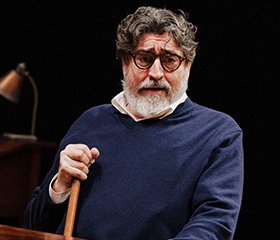When Alfred Molina was first offered the part of Alexander, the professor, in LCT’s current production of Chekhov’s Uncle Vanya, he didn’t immediately say yes. “When I was younger,” Molina told me, “I would see Vanya and the professor would piss me off. He seemed grumpy and constantly complaining. I wondered what I could do differently.”
But when Heidi Schreck’s new version of the play arrived, he said that “all bets were off. Her professor didn’t feel so full of condescension.” Molina added, “The professor felt less theoretical, less full of philosophy. And since actors like action -- actors need verbs – I was seduced. I signed on.”
Molina studied Uncle Vanya at drama school, in his native London, but had never performed in it. His Chekhov play was The Cherry Orchard. “I’ve done three productions of it,” he said. “Once, in rep, in England. A second time at a small theater in Los Angeles” – where, until a recent move to New York, Molina has been based for most of his career, appearing in such blockbuster movies as Spider-Man 2 and etching memorable portraits in numerous smaller films, my absolute favorite being his gun-wielding drug addict in Boogie Nights. Talk about bravura.
Molina’s third Cherry Orchard was at the Mark Taper Forum, in L.A., with Annette Bening, in 2006. By then, he had seen a production of the play at the Maly Theater, in St. Petersburg, Russia, where he had gone to work in a movie version of Anna Karenina. “This was the late 90s,” Molina said, “and we were the first American-studio production to film entirely in Russia after the Cold War.” He added: “I remember that Cherry Orchard production being done at a very relaxed pace. It was very funny.” One of the Russian actors Molina met in St. Petersburg told him that in the old Soviet days, when skilled performers often had jobs with a theater company for life, troupes would sometimes rehearse a Chekhov play for a year.
Molina thought he had misheard. “You mean for TWELVE months?” he asked. The Russian actor replied, “Well, why not? The guy only wrote five plays.”
Upon reflection, Molina decided that this rehearsal schedule wasn’t quite as mad as it seemed. “One of the primary aspects of a great play,” Molina said, “is that it can stand up to a constant, microscopic level of scrutiny. It can accommodate multiple readings from the actors and a variety of interpretations from the foreign-language adaptor. Heidi’s version for example, feels modern but not insistently so.”
One of the many elements of Schreck’s text that got Molina thinking was a line that didn’t make it into the currently performed version of the play. The professor is told he is a man who has trouble relaxing “around a woman who doesn’t belong to you.” Molina remarked, “That line struck me hard and has stayed with me. It gets to the toxic nature of male privilege.”
I mentioned one of Schreck’s lines, delivered by the professor, that had had a similarly striking impact on me: he tells those assembled at the country estate, “Everyone is suffering. I alone am in bliss.” Molina commented: “I wonder how completely accurate that is. It’s true that the professor gained fame as an urban intellectual, an expert on art. He feels that by visiting his family in the country he has walked into a situation that is a bit beneath him. He’s unsettled.”
And yet, Molina continued, “there’s the suggestion that his fall from grace came about because he, an apparently tenured teacher, got ‘cancelled.’ That makes him more vulnerable than he first appears. For an actor, it makes him more playable. Heidi has given all of us many layers to play. It’s wonderful.”
Brendan Lemon is a freelance journalist in New York.
